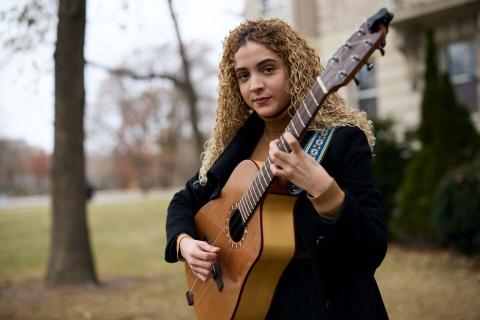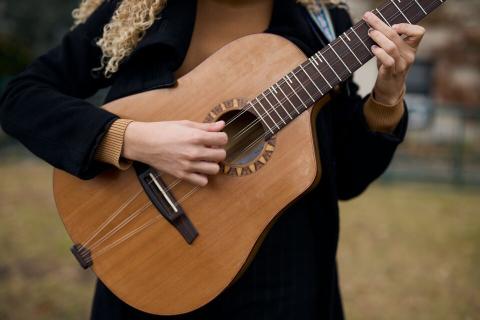Olivia Soler Espinosa Brings Cuba’s National Instrument to Berklee

Olivia Soler Espinosa
Image by Kelly Davidson
Olivia Soler Espinosa, from Havana, Cuba, is Berklee's first woman tres player. She arrived at the college in September of 2022, and in 2023 her skill with the traditional Cuban instrument, a relative of the guitar, earned her a Gifted Tuition Scholarship from the Latin Grammy Cultural Foundation(Opens in a new window), which offered significant financial support that allowed her to continue her studies at Berklee.
Soler began playing guitar nearly a decade ago and picked up the tres a few years later. Now, at only 21 years old, she has been able to defy the odds and prove herself amongst the music and tres community. She currently receives private instruction within the Guitar Department, as the instrument is not yet widely represented at Berklee. However, Soler’s success and presence in the Berklee community is sure to become a beacon to future generations of tres players that will come to campus.
In this interview, we sat down with Soler Espinosa to hear about her life and journey at Berklee so far.
The following interview has been translated from Spanish and has been edited for length and clarity.
First off, could you talk about your instrument: What is a tres, and what, or who made you want to play one?

Olivia Soler's tres
Image by Kelly Davidson
The tres is a Cuban instrument, similar to the guitar since it belongs to the guitar family. It is Cuba's national instrument and was born in the eastern part of Cuba. What made me play it? Well, I first came from the guitar. I played the guitar first, and because the tres was so similar, I saw it one day and fell in love with it. I began to study it with a teacher, and then I began to study it in a conservatory.
What’s one piece of advice you would give to someone interested in learning a new instrument such as a tres?
I would say that it is important to know the roots of the instrument and study the authors and players of classical guitar, electric guitar, and tres as well. It’s important to investigate the roots of the tres such as “treceros” or players that influenced the growth of the instrument.
Do you have specific people you have studied who are your favorite or who you would recommend others to study?
Pancho Amat is currently the most important figure of the tres. Others like Niño Rivera, who was a vanguard of that instrument and took the tres to jazz and composed a lot with it in that genre, and Arsenio Rodriguez. For current figures, I would say Renesito Avich, and as I said before, Pancho Amat.
Tell me about the experience of being Berklee's only woman tres player. What's it been like for you—creatively, personally, or culturally—to find a place in this community?
Well, for me it is a grand achievement, to arrive at Berklee with the instrument being a woman, because for that instrument it's not very common. I mean, it's not at all common for women to play it. It has always been a male instrument, mostly because of sexist issues, because women "can't play it as much or as well as men", and bringing it to Berklee is an amazing achievement because it's not at all common here. It's a traditional instrument and a typical Cuban instrument, it's not like the piano which is a more universal instrument. I feel that I will be able to grow a lot with the resources that Berklee gives me, especially because of the different types of music that I will get to know here, as well as the musicians and professors who are going to nurture me in different ways, and who are going to help me showcase my potential.
Watch Olivia Soler Espinosa's Grammy Cultural Foundation scholarship submission video:
What's your favorite thing about playing the tres?
The instrument's timbre is what brought me in—that is to say, the sound of it and the fact that any musician who plays it will sound good. Many people want to limit the instrument to only Cuban music or traditional folk music, but in jazz, it sounds good, in classical music it sounds good, and it can be a nice touch to any genre. I played three movements in Cuba with the symphony orchestra, which sounded great. The timbre of the tres in any music you put it in, sounds great.
How has arriving at Berklee affected how you think about, listen to, and share music?
I have always loved jazz, but I had never felt the desire to get so deeply into the genre, that is, to dedicate myself to learning it deeply. Here at Berklee, playing this style has opened my mind and doors to different genres.
What is something you wish others knew more about you?
Something I want people to know about me is that I am sometimes timid and introverted and sometimes many people don't approach me, or don't talk to me. They think that I am very serious or that I am unapproachable. I don't know why, but that's the impression I give most of the time, but I'm not like that. When people get to know me they get to see how friendly I am and everything goes well when there is more trust. They don't approach me because I think they feel I'm a little bit too serious or something, but I want them to know that I don't bite and I love meeting new people, so I wish people could see that more often.
